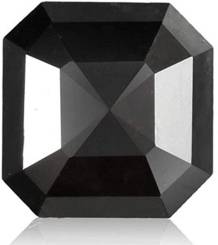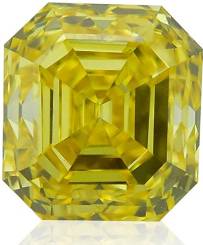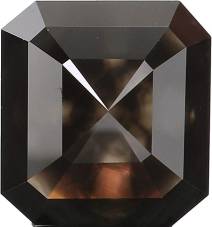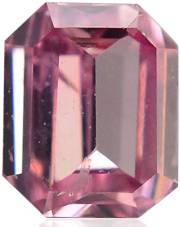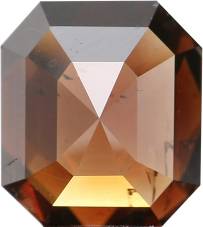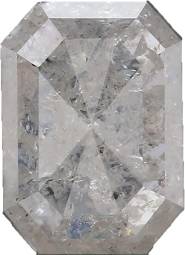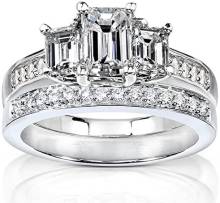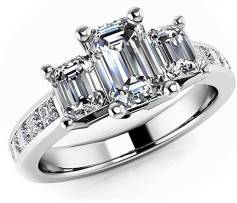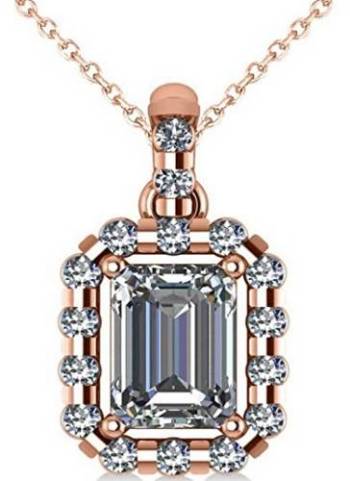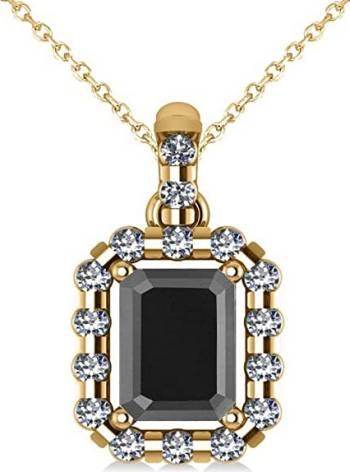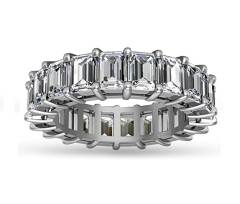An Emerald cut diamond displays a distinct aura of shape and optics. The glorious gem derives a downright different visual sensation from its step-cut facet design. Also, the diamond has a large surface table and deep clarity.
Click On The Images
Emerald cut diamonds typically have rectangular contours. They feature chiseled steps of rectilinear facets. These facets are horizontal as opposed to the vertical ones of round brilliant diamonds. They run parallel to the girdle, on the crown and pavilion.
The corners of the stone are cropped to add stability andbri avert fractures. This converts the diamond shape into an octagon. It still appears a rectangle to our eyes as the four sides thus added, are unnoticeably small.
An emerald cut diamond acquires its inimitable look thanks to the step cuts of its pavilion and its large, open table.
The emerald cut diamond produces a hall of mirrors effect instead of the sparkle of a brilliant cut. Light and dark planes interact to create this effect. While less fiery, the emerald cut has an elegant appeal due to its long lines and dramatic flashes of light.
Originally designed for gemstone emeralds, the cut was subsequently adopted for cutting diamonds. And therein lies the root of its name.
Click On The Images
Emerald Cut Diamond History: |
The emerald cut is one of the oldest diamond shapes. The style originated from the table cuts of the 1500s. Originally, lapidaries created this shape for emeralds. The cut found fast acceptance among gem-cutters since it reduced the pressure on the gem during cutting. It thus protected the gems from chipping.
The diamond industry soon adopted this new shape and started applying it to diamonds as well. Yet, the name ‘emerald cut’ was coined much later in the 1920s. The cut became increasingly popular around that time. Emerald cut trend was spurred by the art deco era’s appreciation of symmetry and clean lines.
2.88 Ct Natural Loose Diamond Emerald White Milky Color 9.80 MM
Click On The Image
Endorsement by Celebrities: |
Fans of understated elegance have always cherished the subtle beauty of this cut. What’s more, well-loved celebrities like Amal Clooney, Angelina Jolie, Beyoncé, Jennier Lopez, Kim Kardashian, Jennifer Lawrence and others have all sported emerald cut diamond rings in recent times. This has immensely increased the interest around the cut.
Consequently, emerald cuts are seeing a great resurgence in popularity. They are being increasingly preferred for engagement & wedding rings as well as other jewelry pieces.
Click On The Images
Emerald Cut Diamond and The Four Cs: |
Clarity:
The emerald cut gives the diamond a rather large table facet. It is a window into the very heart of the gem. Moreover, the long step facets ooze lazy, slow scintillation. As such, inclusions, if any, are easy to see.
In complete contrast, round brilliant diamonds have a small table facet. Also, their facet arrangement spews rapid scintillation. Both these factors combine to cloak the inclusions and render them invisible in the round cut.
A Higher Clarity Grade Rough Has To Be Selected:
For this reason, lapidaries select rough diamonds of higher clarity grade to carve into emerald cuts. Conversely, they select other cuts like round brilliants to chisel lower clarity diamonds as they camouflage inclusions. This aspect adds cost to an emerald cut diamond. At the same time, shaping an emerald cut causes less loss of diamond-rough. The two factors balance each other. Consequently, price is not affected much on this account.
14k Gold Emerald-Cut Diamond Pendant Necklace
Click On The Image
So, What Clarity Grade Should I Select:
While buying a round brilliant, you can go down till SI clarity and still the diamond can look eye-clean. But, if you are buying an emerald cut, you will have to consider VS clarity as a starting point for eye-clean stones. From here you can move to higher clarity grades according to your budget.
The Color Attribute:: |
We have seen above that an emerald cut diamond shows inclusions more readily due to certain typical features. The very same features, namely, the large open table, step cut and parallel faceting structure with slow scintillation once again come together to accentuate the inferior color.
Furthermore, a stone’s cut proportions can cause the color to concentrate at its corners.
Again, a Higher Color Grade Rough Has To Be Selected:
In consequence, emerald cuts are created from rough diamonds of higher color grading. Needless to say, this adds to the cost of the resulting emerald cut diamond. Then again, sculpting an emerald cut causes less wastage from the base rough crystal. This counterbalance keeps its price in check. And we see that price per carat is generally lower for emerald shape in comparison to round brilliants of similar quality.
So, What Color Grade Should I Select:
A person shopping for a round brilliant can find an acceptable diamond in the I to J color grades. On the other hand, a person looking for an emerald cut diamond should contemplate the G-H range as the beginning point. From here on he can move to higher color grades as per his budget. He should select the highest color grade suitable to his budget.
14k Gold Diamond and Emerald Cut Black Diamond Halo Pendant Necklace
Click On The Image
Emerald Cut Guide: |
Rectangular to square shape, sculpted step-cuts and rectilinear facets parallel to the girdle are the hallmarks of an emerald cut. The concentric parallel rows of facets run on the crown as well as the pavilion. The corners to the four longer sides of the diamond are beveled.
The emerald cut can have upto 58 facets with 25 on crown, 8 on girdle and 25 on pavilion. The facets have a design that reduces the brilliance & fire. The stone, however, reveals a classic beauty and elegance that are not apparent in other cuts.
Emerald cut diamonds tend to be subtle and understated, with less refraction and reflection than brilliant cuts.
Diamonds refract and reflect light incident upon them differently depending on the size, placement, and symmetry of their facets. Unproportioned, too many, or too few number of facets yield a diamond that is less than perfect.
The GIA has officially spelled out such proportions and symmetry for round brilliant diamonds only. It is called the cut grade of round brilliant diamonds.
Emerald cut diamonds don’t have such an official cut grade. Nevertheless, certain known cut proportions are seen to yield exuberant diamonds. These proportions are tabulated as follows:
| EXCELLENT | VERY GOOD | GOOD | FAIR | POOR | |
| Table % | 61 – 69 | 57 – 60 or 70 – 72 |
54 – 56 or 73 – 74 |
51 – 53 or 75 – 79 |
< 51 or > 79 |
| Depth % | 61 – 67 | 59 – 60.9 or 67.1 – 70 |
57 – 58.9 or 70.1 – 74 |
54 – 56.9 or 74.1 – 79 |
< 54 or > 79 |
| Girdle | Very Thin – Slightly Thick | Very Thin to Thick | Very Thin to Very Thick | Ex. Thin to Ex. Thick | |
| Culet | None | Very Small | Small | Medium | > Medium |
What Weight To Choose: |
First thing to keep in mind while deciding the weight of your stone is your personal preference and taste. The second and more important thing is your budget. These two factors predominantly determine the weight of the diamond you decide to buy.
5.00 ct Emerald Cut Diamond Eternity Wedding Band Ring in 14 kt White Gold
Click On The Image
You do have to keep in mind that this cut is unforgiving to inclusions as well as inferior color. The larger the diamond, the higher the visibility of these two lacunas. So, you will have to choose higher clarity and color grade. This compounds the upward pull on the price. So you have to check and balance based on your choice and your budget.
Having said that, a diamond in the range of 0.80 carat to 1.00 carat range with ‘SI1’ or above Clarity and ‘I’ or above in color would make a good choice.
Length To Width Proportions: |
From the square Asscher shape to a more elongated emerald cut, the overall shape of an emerald cut can vary significantly.
Your personal taste greatly influences the shape of the diamond. A long, slender shape appeals to some, whereas a rectangular form will appeal to others.
Generally, the more square the shape, the better it is for someone with long and slender fingers. On the other hand, a diamond with a rectangular shape is better suitable for someone with short and thick fingers.
The most popular choice is a balanced rectangle with a length/width ratio of 1.4. This ratio is calculated as length in millimeters divided by width in millimeters.
Length to Width Guide:
| EXCELLENT | VERY GOOD | GOOD | FAIR | POOR | |
| Square | 1.00 – 1.03 | 1.04 – 1.05 | 1.06 – 1.08 | > 1.08 | |
| Rectangle | 1.40 – 1.50 | 1.30 – 1.39 or 1.51 – 1.60 |
1.20 – 1.29 or 1.61 – 1.80 |
1.15 – 1.19 or 1.81 – 1.90 |
< 1.15
or > 1.90 |
Are Emerald Cuts More Expensive? |
Simple answer: No.
A ring with an emerald cut will cost less than a ring with a round diamond. Moreover, it will also cost less than most other diamond shapes. Two reasons account for this: lower demand-pull on the price and higher yields on cutting.
5.00 ct Emerald Cut Diamond Eternity Wedding Band Ring in 14 kt White Gold
Click On The Image
Coincidentally, the shape of the emerald cut closely resembles the natural shape of a rough crystal diamond. Consequently, you lose the least weight while crafting an emerald cut. Less wastage means you get more diamond weight out of the rough. This pushes down the price.
On the flip side, you do have to choose higher clarity and color grade for this cut because of reasons discussed above in this article. This somewhat pulls up the price. But overall, we do find that diamonds sporting this cut are less expensive than most other cuts.
See More Diamond Shapes As Follows:
| Baguette Diamonds | Marquise Diamond |
| Princess Cut Diamonds | Round Brilliant Diamond |
| Asscher Cut Diamond | Diamond Shape |
